Objects Κέντρον Ερεύνης της Ιστορίας του Ελληνικού Δικαίου
<< 10
10 >>
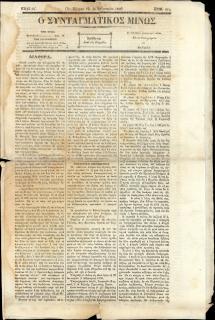
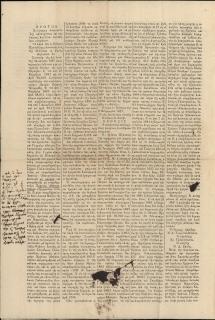
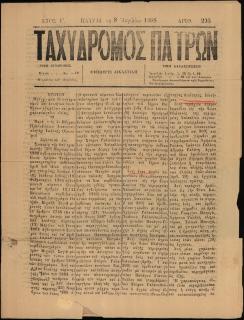
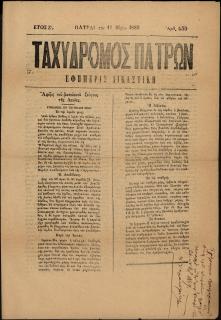
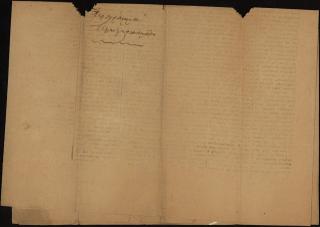
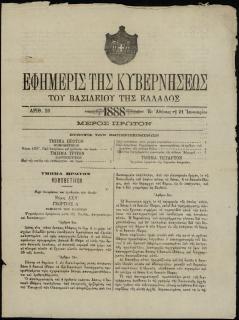
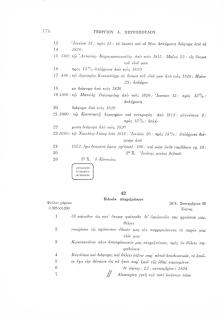
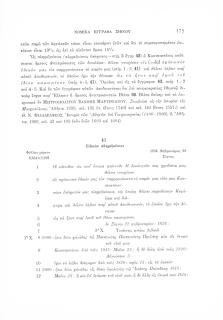
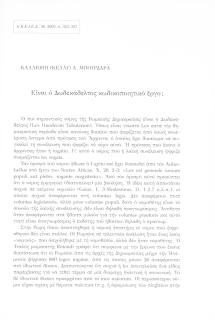
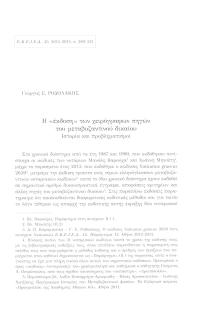
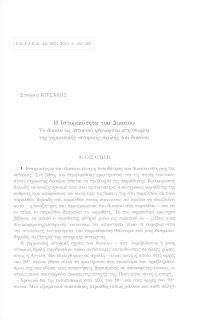
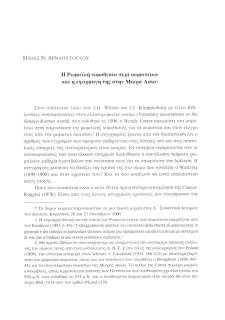 << 10
10 >>
<< 10
10 >>
Total: 11921

Εφημερίδα Ο Συνταγματικός Μίνως, εν Πάτραις 10 Φεβρουαρίου 1856, στην οποία δημοσιεύεται το πρόγραμμα δηλοποιήσεως πλειστηριασμού ακινήτου κτήματος των ανήλικων τέκνων κληρονόμων του αποβιώσαντος Ιωάννη Ζαρουχλιώτη, Αλεξάνδρου, Ελένης, Ακριβούλας και Θεοδώρου, με επίτροπο και κηδεμόνα τη μητέρα του Κωνσταντίνα.
Ενότητα: Συλλογή Χ. Παπαστάθη
Επίσης, δημοσιεύεται και η σχετική έκθεση αναγκαστικής κατασχέσεως ακινήτου κτήματος.
Εφημερίδα δικαστική 'Ο Ταχυδρόμος Πατρών' που δημοσιεύει προγράμματα αναγκαστικής κατασχέσεως με τις σχετικές εκθέσεις αντίστοιχα για τον οφειλέτη Χρήστο και Γεώργιο Γαλανόπουλο προς τον δανειστή Σπ. Σκλαβούνο, για τον οφειλέτη Σπ. Α. Γαλανόπουλο προς τον δανειστή Σπ. Σκλαβούνο και για την οφειλέτρια Παναγούλα Αγ. Καστανιώτου συζύγου Διο. Κεφάλα προς τον δανειστή Σπ. Σκλαβούνο.
Ενότητα: Συλλογή Χ. Παπαστάθη
Αφορά στο διάστημα Ιανουάριος - Μάρτιος 1887.
Εφημερίδα δικαστική 'Ταχυδρόμος Πατρών
Ενότητα: Συλλογή Χ. Παπαστάθη
Εφημερίδα δικαστική 'Ταχυδρόμος Πατρών", έτος Ε΄, αριθ. 296. Το πρόγραμμα και την έκθεση υπογράφει ο κλητήρας Ιωάννης Οικονόμου.
Εφημερίδα δικαστική 'Ταχυδρόμος Πατρών' με περιεχόμενα: α) άφιξη του βασιλικού ζεύγους της Δανίας και β) πρόγραμμα αναγκαστικής κατάσχεσης και πώλησης ακινήτου και ενυπόθηκου κτήματος του Χρήστου Χρονόπουλου στις 26 Νοεμβρίου 1889 στη Χαλανδρίτσα.
Ενότητα: Συλλογή Χ. Παπαστάθη
Εφημερίδα δικαστική 'Ταχυδρόμος Πατρών', έτος Ζ΄, Πάτραι την 11 8βρίου 1889, αριθ. 430.
Εφημερίδα, που περιέχει το πρόγραμμα αναγκαστικής κατάσχεσης και πώλησης ακινήτου κι ενυπόθηκου κτήματος του οφειλέτη Χρήστου Χρονόπουλου.
Ενότητα: Συλλογή Χ. Παπαστάθη
Δεν υπάρχει περιγραφή
Εφημερίς της Κυβερνήσεως, μέρος Α΄, εν Αθήναις τη 21 Ιανουαρίου 1888 (αριθ. 20), Νόμος ΑΧΝ΄ 'Περί διακρίσεως και οροθεσίας των δασών'.
Ενότητα: Συλλογή Χ. Παπαστάθη
Δεν υπάρχει περιγραφή
Εἰδικόν πληρεξούσιον, 1824, Σεπτεμβρίου 22, Σίφνος
Ενότητα: Νομικές Πηγές της Μεταβυζαντινής Περιόδου και του Νεοτέρου Ελληνισμού
3, τεύχος Ι
Εἰδικόν πληρεξούσιον, 1824, Φεβρουάριος 22, Σίφνος
Ενότητα: Νομικές Πηγές της Μεταβυζαντινής Περιόδου και του Νεοτέρου Ελληνισμού
3, τεύχος Ι
Εἲναι ὁ Δωδεκάδελτος κωδικοποιητικό ἒργο;
Ενότητα: Μελέτες Ιστορίας Δικαίου
36
Η «έκδοση» των χειρόγραφων πηγών του μεταβυζαντινού δικαίου. Ιστορία και προβληματισμοί
Ενότητα: Μελέτες Ιστορίας Δικαίου
G. Rodolakis: Post-Byzantine legal manuscripts' editions. History and problems During the last thirty years, thirty one volumes of Greek post-Byzantine notary archives have been published as well as a considerable number of individual legal documents (contracts, court decisions, etc). On the occasion of this flood of publications and of the observation that no consistent editorial method was followed in them but instead each editor has applied his/her own rules, I review the efforts for establishing a certain, commonly accepted, set of rules for the edition of Byzantine and post-Byzantine documents. Then, I enumerate the publication of post-Byzantine legal sources and I go through the most important editions in the second half of the twentieth century till today, with special attention paid to the editorial methods employed as well as the arguments for and against the choice of the particular method; and finally I assess the editorial questions arisen.
Η Ιστορικότητα του Δικαίου. Το δίκαιο ως ιστορικό φαινόμενο στη θεωρία της γερμανικής ιστορικής σχολής του δικαίου
Ενότητα: Μελέτες Ιστορίας Δικαίου
S. Kitsakis: Historicity of Law. Law as a phenomenon of history in the theory of the German Historical School By the end of the 18th and at the outset of the 19th century two of the most famous Codifications of law made their appearance: The Prussian “Landrecht" and the Code Civil. The inherent claim of such a systematic collection of legal rules was to comprehensively regulate various aspects of social life. That claim provoked the emergence of a school of legal thought: The school of Historical jurisprudence. Friedrich Carl von Savigny, the undisputed leader of that school, argued against a codification of German law, in his essay “Vom Beruf unserer Zeit für Gesetzgebung und Wissenschaft”, written in 1815, where he laid the ground for the analysis of law as a so- cio-historical phenomenon and shaped the language of such analysis with expressions such as: “Volksgeist” and “Recht als Organismus” (law as an organism). His theory on the sources of law emphasises the complexity of law creation drafting it as a multilayered procedure. His mos...

